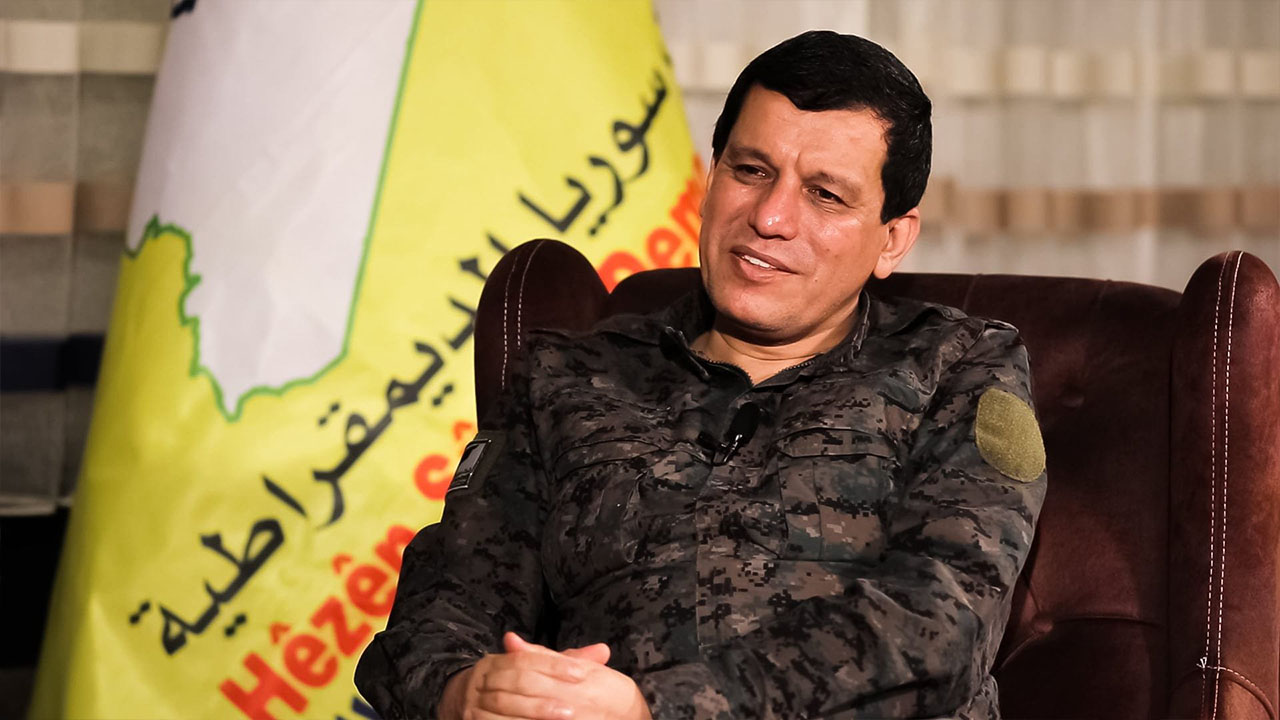In an exclusive interview with Channel 8, Mazloum Abdi, the General Commander of the Syrian Democratic Forces (SDF), discussed the future of Syria, the role of Kurdish unity, negotiations with the new Syrian administration, and ongoing Turkish attacks. Speaking to Channel 8’s Ahmed Najm, Abdi emphasized that the SDF remains committed to building a decentralized Syria and resisting Turkish aggression, asserting, “We will not step back.” He also addressed the SDF’s position in the face of U.S. policy shifts and the continued ISIS threat.
Comparing the Assad and Saddam Regimes
Mazloum Abdi compared Syria’s ongoing conflict to the fall of Saddam Hussein’s Iraq, highlighting the similarities and key differences between the two regimes. He noted that both Assad and Saddam ruled through totalitarian means, refusing reform until their downfall. However, Iraq’s regime collapsed due to direct international intervention, while Syria remains entangled in a protracted civil war.
“Syria’s future remains uncertain,” Abdi stated. “Unlike Iraq, where a new government was quickly formed, Syria is fragmented, with groups like Tahrir al-Sham controlling significant areas. After 14 years of war, we are hopeful for peace, and we aim to be part of a new, stable Syria.”
Negotiations with the New Syrian Administration
Abdi confirmed recent discussions with Ahmed al-Sharaa, a key figure in Syria’s transitional government. He emphasized that while both sides want a united Syria, major disagreements persist.
“Our fundamental issue is centralization,” Abdi explained. “The new administration seeks to preserve central rule, while we advocate for a decentralized system that acknowledges Syria’s ethnic and regional diversity.”
He revealed that international mediators, including the U.S., Britain, and France, are involved in these discussions, aiming to find a middle ground that would incorporate the autonomy of northeast Syria into a broader Syrian framework.
Turkish Attacks and Regional Tensions
One of the most pressing issues Abdi discussed was Turkey’s ongoing attacks on key infrastructure in northeast Syria. He accused Ankara of seeking to occupy Kobani and expand its control over Syrian territories, particularly targeting strategic locations like the Tishreen Dam and Karakozak Bridge.
“Our forces have been resisting these attacks for nearly two months,” Abdi said. “Unfortunately, the international coalition has not taken strong measures against Turkey’s aggression.”
He also disclosed ongoing negotiations with the Syrian government regarding a potential ceasefire at the Tishreen Dam, stressing that regional stability is crucial for preventing further conflict.
The Future of the SDF and U.S. Presence
With persistent rumors about a possible U.S. military withdrawal from Syria, Abdi clarified the SDF’s position. He acknowledged that while a withdrawal would impact security and increase ISIS activity, it would not mean the end of the SDF.
“The SDF existed before the U.S. arrived,” he stated. “We have fought and defended our land with or without international backing. However, the U.S. has assured us that its presence in the region will continue for now.”
Abdi reiterated that ISIS remains the primary security threat, particularly as Turkish-backed attacks complicate efforts to control detained ISIS members in facilities like al-Hol. He called for international cooperation to ensure that ISIS does not regain strength.
A Decentralized Syria and Kurdish Unity
A key theme of Abdi’s interview was the need for a decentralized government in Syria. He argued that a centralized state would only fuel further conflict, given the country’s ethnic and religious diversity.
“Syria’s stability depends on a system where communities have decision-making power in their regions,” he said. “This is not just a Kurdish issue—Alawites, Druze, Christians, and Arabs must also have a role in shaping Syria’s future.”
Abdi also addressed efforts toward Kurdish unity, revealing that discussions have resumed between Kurdish political parties in Rojava, including the PYNK and ENKS. He stressed the importance of presenting a unified Kurdish front in negotiations with Damascus.
Reflecting on his recent meeting with Masoud Barzani, Abdi expressed hope for stronger ties between Kurdish factions across different regions. “Erbil plays a significant role in Western Kurdish politics, and we hope its influence will support Kurdish unity in Rojava.”
Economic Challenges and Oil Revenue
Abdi acknowledged the economic difficulties facing northeast Syria, particularly regarding oil revenue distribution under a future Syrian government. He emphasized that oil resources should benefit all Syrians rather than being controlled by a centralized regime.
“For decades, the Ba’ath regime neglected northeastern Syria,” he said. “In a new Syria, there must be a fair system where resources are shared equitably.”
He also noted that public services and infrastructure remain a challenge, particularly due to Turkey cutting off water supplies. However, he affirmed that the autonomous administration in Rojava continues to work on improving living conditions despite these difficulties.
Addressing Turkey’s PKK Allegations
Abdi firmly rejected Turkey’s claims that the SDF is linked to the Kurdistan Workers’ Party (PKK), dismissing them as a justification for Ankara’s military operations in Rojava.
“The SDF is an independent force,” he asserted. “Turkey uses the PKK narrative as an excuse to attack us. However, the reality is that the international coalition works with us, not with the PKK. The Kurdish issue in Turkey must be resolved through dialogue, not war.”
A Message from the Kurdish People
At the end of the interview, Channel 8 presented Abdi with recorded messages from Kurds across all four parts of Kurdistan, expressing their solidarity with the SDF and urging him to continue his leadership.
Abdi responded with emotion, reaffirming his commitment to the Kurdish struggle. “We carry the burden of all Kurds,” he said. “The sacrifices made in Kobani and elsewhere will not be forgotten. We will not step back. Our fight for Kurdish rights, a decentralized Syria, and the unity of our people will continue.”


